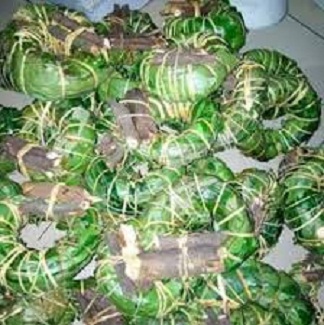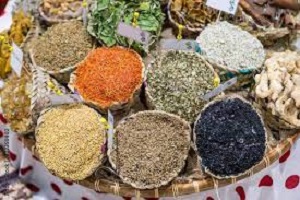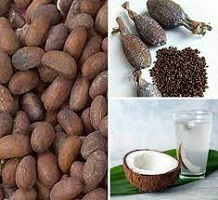Aju Mbaise Herbal Slimming Tea |Weight Loss |Fertility, Side Effects
Aju Mbaise Herbal is a fat burning slimming herb, a combination of 5 diverse leaves, roots and bark of a medicinal tree wrapped together.
It’s an Orthodox method of trimming down and bouncing back post-pregnancy fat by the Mbaise women.
It is usually cooked with uda, uziza seeds, and ehuru ingredients.
Aju Mbaise is most notably good for women to take within 2 weeks after giving birth to flatten their Tummy and give them that figure 8 shape.
Origin of Aju Mbaise
The herb got its name from the people that produce it, a village called Mbaise, in Imo State, Nigeria.
Aju Mbaise Herbal Is Used For the Following Cases
- For those who just had a baby and can’t just get that tummy back to pre-pregnancy size
- Regular bloating
- For those with fat stored in their mid-section
- Difficulties in producing breast milk
- Irregular monthly cycle
- Painful scanty or heavy periods
- Naturally overweight cases
What Is The Function Of Aju Mbaise Herbal?
- Firstly, Aju Mbaise is a natural fertility trimming as it washes away the dead cells.
- Then,it acts acts as an ovulation correction remedy: it helps to make ovulation steadier and less painful.
- Thirdly, it aids to reduce tumor or fibroid at an early stage and removes mouth odor coming out from the stomach
- Aju Mbaise is highly active for weight loss and flattening of tummy (especially for pregnant women immediately after childbirth). This is normally done within 1 month, specifically the first month of delivery to achieve a good result.)
- For weight loss cases, cut down on carbs for it to work and also be consistent. Results are visible from 2-3 weeks of consistent use.
What Is Aju Mbaise In Igbo?
It is the combination of 5 different leaves, roots and bark of a medicinal tree wrapped together to form a coiled wrap, hence the Igbo term Aju (meaning wrap).
However, i don’t know what it is called in Yoruba. Do you know? Please let me know in the comment section.
Preparation and Cooking: Steps In Preparing Aju Mbaise Herbal For Flat Tummy
Aju the wonder herb, health fitness tips:
- Firstly, for the tea, put a teabag in a cup, add hot water, stir for 15 minutes, your tea is ready.
- Then, for the raw aju mbaise, wash the wrap with water, don’t loosen it up.
- After that, add the spices and cook for 30 minutes, or until you notice that the color has turned golden.
- Lastly, sieve out the water or tea. Allow cooling before pouring it in a cup or jar.
Above all, it has a bitter alkaline taste with a delicious aroma. Alternatively, some people prepare theirs like yam pepper soup.
How do I use Aju Mbaise?
Allow cooling and drink throughout the day.
Aju Mbaise Herbal for Weight Loss: Does It Work?
Yes! Aju Mbaise can help with overall weight loss in the following ways:
- It reduces appetite and burns calories effectively; has a diuretic, choleretic and laxative effect and normalizes metabolism,
- Acts as lipolysis:
Lipolysis can lead to the achievement of your fat loss goals because it breaks down your fatty acids at a quicker pace and uses them for energy that the body needs throughout the day.
- It also has a thermogenic effect on weight loss. Thermogenic supplements boost to increase fat burning, metabolism, and reduce appetite.
- Lastly, it purifies the blood; regulates the female cycle; and is great for diabetics’ patients.
Who Can Use the Aju Mbaise Herbs?
- Nursing mothers (during the Omugo period)
- Women with big tummies who have given birth before. It is also good for men with a protruding stomach.
- Also, men and women who want to burn fat, slim down, and reduce their weight can drink the herbal tea.
Please note: I am not very sure whether women who gave through C-section/ cesarean operation can take it after cs or whether it is safe for children to use.
I will do more research on this and update in my next post.
Benefits of Aju mbaise Herbal Tea
- Flat tummy and weight loss
- Irregularity in menstruation
- Bad/stale blood removal (infection flush)
- For detoxification
- Ovulation correction
- Shrinks fibroid or tumor at the early stage.
- Enhances fertility in women by cleansing unwanted dead cells.
- Natural remedy to reduce high blood pressure
- It prevents mouth odor that comes out from inside the stomach.
- Prevents fallopian tubal blockage
- Reduces pot belly in men.
- Corrects hormonal imbalance in men and women.
- It nourishes the skin.
- It’s an anti-diabetic, cancer, tumors, ovary cysts and malaria.
Please note: You need 4 wraps of Aju mbaise (a month dosage) for effective results.
Where to Buy/Get Aju Mbaise for Sale
I have bought this wonder herb at oyinbo market at Ebutte Metta Lagos. My sister told me she buys hers from Ibadan.
Side Effect of Aju Mbaise
There are no side effects of this remedy from the testimonies so far not even case of miscarriage/abortion.
Infant, it is usually used by women who just miscarried to flush out dirt and remnants; it acts as a cleanser/sanitize agent.
Nevertheless, you should be aware of these issues:
- Excess consumption can cause light-headedness.
- Exclusive breastfeeding mothers should take it moderately, drinking too much of the remedy can slim down the baby and cause drowsiness.
Aju from Mbaise: Uses, Health Benefits and Side Effects
Health Benefits of Aju from Mbaise
Aju from Mbaise is an herbal blend consisting of the bark, leaves, and roots of five different plants, including ginger, uda (Negro pepper), and uziza.
Traditionally used in the preparation of pepper soup and various medicinal concoctions, it is sought after for its numerous health benefits.
The term “Aju from Mbaise” translates to “wrap from Mbaise,” referring to its origin in the village of Mbaise, Imo state. Despite its regional roots, the herb has gained popularity nationwide due to its acclaimed health properties.
Particularly favored by new mothers and those desiring weight loss, Aju from Mbaise is now commonly packaged as “slim tea” for convenient consumption.
Presented in wrapped leaves secured with small sticks, each component of Aju from Mbaise offers unique advantages.
Boiled without unwrapping, the herb-infused water is often enhanced with additional ingredients for taste.
While the brew carries a bitter-sharp flavor from its spices, its aroma is appealing. It can be enjoyed alone as a tea or used in cooking, though individuals seeking rapid results, such as those aiming to slim down, often prefer drinking the tea directly.
Health Benefits of Aju from Mbaise
Nutritional and Phytochemical Properties of Aju from Mbaise
In a 2019 study, researchers investigated the phytochemical composition of the ethanol extract of Aju from the Mbaise herbal mixture.
The findings revealed a significant presence of various phytochemicals in the herbal decoction.
The analysis identified alkaloids (8.69%), flavonoids (19.10%), glycosides (6.86%), hydrogen cyanide (0.92%), phenols (31.56%), saponins (0.83%), steroids (0.94%), tannins (16.80%), and terpenoids (14.31%).
In this article, we’ll explore some of the health benefits associated with Aju from Mbaise, shedding light on the advantages you can gain from incorporating this herb into your regimen.
Post-pregnancy Benefits
Due to its advantages for postpartum recovery, Aju from Mbaise is well-liked by new mothers. Primarily, it aids in replenishing essential nutrients depleted during pregnancy.
Additionally, it facilitates the reduction of postpartum abdominal bloating, restoring the stomach to its pre-pregnancy size.
Furthermore, Aju from Mbaise supports lactation by promoting breast milk production and assists in regulating the menstrual cycle post-delivery.
Moreover, a medical study conducted in 2016 revealed another potential health advantage of Aju from Mbaise.
The study findings indicated that the herbal decoction exhibited inhibitory effects on the proliferation of harmful bacteria in lactating mothers, further highlighting its therapeutic potential.
2. Weight Loss
Aju from Mbaise proves highly effective in aiding weight loss, particularly in reducing abdominal fat. Its mechanism involves breaking down fats into acids, facilitating their elimination from the body.
Additionally, it promotes metabolism, enabling the body to efficiently burn fat. These benefits extend to both women and men, making Aju from Mbaise a valuable asset in achieving healthy weight management goals.
3. Balance Menstrual Cycle
Women experiencing irregularities in their menstrual cycle often turn to Aju from Mbaise to restore balance and promote regularity, resulting in a more predictable and consistent menstrual flow.
Additionally, it alleviates menstrual discomfort, offering relief to those who suffer from menstrual pain.
4. Womb Flusher
Women utilize Aju from Mbaise to cleanse their wombs, expelling residual blood, fluids, and any other debris accumulated post-childbirth.
This practice not only diminishes the size of the womb but also aids in abdominal reduction.
Furthermore, women who have experienced miscarriages or abortions utilize Aju from Mbaise to purge their wombs, fostering uterine health and mitigating potential complications in future pregnancies.
5. Tackle Fibroid and Tumor
Women also consume Aju from Mbaise herb to address early-stage fibroids or tumors, aiming to reduce their size and alleviate the discomfort caused by their growth.
6. Fertility Potion
Aju from Mbaise also enhances fertility in women by promoting uterine dilation and purification, rendering it conducive and prepared for pregnancy.
Side Effects of Aju from Mbaise
The risks associated with consuming Aju from Mbaise are generally minimal, but caution is advised.
Pregnant women are advised to avoid the herb due to its potential to increase the risk of miscarriage and birth defects in babies.
Nursing mothers should also moderate their intake as it may impact the baby’s weight.
Common side effects include light-headedness or dizziness when consumed excessively, as well as increased hunger.
Overall, it’s important to consume the herb in moderation to mitigate any potential adverse effects.
What is the composition of Aju from Mbaise?
Aju from Mbaise is a blend comprising ginger roots, traditional leaves, uziza seeds, uda, and the bark of a specific medicinal tree indigenous to Mbaise.
Uhiokirihio, or whole spice, is incorporated with the Aju from Mbaise leaves. This combination not only enhances the flavor but also acts as a fat-burning spice, targeting the reduction of starch in cooked meals.
How do you use dried aju from Mbaise?
Make sure to obtain the dried ingredients and blend them at the market.
Take one aju from Mbaise, wash it thoroughly without untying it, and place it in a pot along with the attached sticks.
Add one full spoon of the blended spices to the pot, then pour in enough water to cover the aju. Cook for approximately 30 minutes, then remove from heat.
What do dehydrating herbs do?
The cell walls bring out the flavor. Dried herbs can be stored successfully for up to one year in a cool, dry, dark place.
Drying herbs at too high a temperature can result in flavor loss. The best time to harvest herbs for drying is before the flowers first open (the bursting bud stage).
What are the benefits of spice-infused water?
Here are a few of the benefits of spices when consumed in the morning, shared by Sharanya:
- Drinking spices soaked in water can prevent the onset of inflammation in the body.
- They have anti-inflammatory properties and are antioxidants for the body.
- They help boost metabolism.
- Improve digestion.
Aju from Mbaise: Uses, Health Benefits and Side Effects
Health Benefits of Aju from Mbaise
Aju from Mbaise is an herbal blend consisting of the bark, leaves, and roots of five different plants, including ginger, uda (Negro pepper), and uziza.
Traditionally used in the preparation of pepper soup and various medicinal concoctions, it is sought after for its numerous health benefits.
The term “Aju from Mbaise” translates to “wrap from Mbaise,” referring to its origin in the village of Mbaise, Imo state. Despite its regional roots, the herb has gained popularity nationwide due to its acclaimed health properties.
Particularly favored by new mothers and those desiring weight loss, Aju from Mbaise is now commonly packaged as “slim tea” for convenient consumption.
Presented in wrapped leaves secured with small sticks, each component of Aju from Mbaise offers unique advantages.
Boiled without unwrapping, the herb-infused water is often enhanced with additional ingredients for taste.
While the brew carries a bitter-sharp flavor from its spices, its aroma is appealing. It can be enjoyed alone as a tea or used in cooking, though individuals seeking rapid results, such as those aiming to slim down, often prefer drinking the tea directly.
Health Benefits of Aju from Mbaise
Nutritional and Phytochemical Properties of Aju from Mbaise
In a 2019 study, researchers investigated the phytochemical composition of the ethanol extract of Aju from the Mbaise herbal mixture.
The findings revealed a significant presence of various phytochemicals in the herbal decoction.
The analysis identified alkaloids (8.69%), flavonoids (19.10%), glycosides (6.86%), hydrogen cyanide (0.92%), phenols (31.56%), saponins (0.83%), steroids (0.94%), tannins (16.80%), and terpenoids (14.31%).
In this article, we’ll explore some of the health benefits associated with Aju from Mbaise, shedding light on the advantages you can gain from incorporating this herb into your regimen.
Post-pregnancy Benefits
Due to its advantages for postpartum recovery, Aju from Mbaise is well-liked by new mothers. Primarily, it aids in replenishing essential nutrients depleted during pregnancy.
Additionally, it facilitates the reduction of postpartum abdominal bloating, restoring the stomach to its pre-pregnancy size.
Furthermore, Aju from Mbaise supports lactation by promoting breast milk production and assists in regulating the menstrual cycle post-delivery.
Moreover, a medical study conducted in 2016 revealed another potential health advantage of Aju from Mbaise.
The study findings indicated that the herbal decoction exhibited inhibitory effects on the proliferation of harmful bacteria in lactating mothers, further highlighting its therapeutic potential.
2. Weight Loss
Aju from Mbaise proves highly effective in aiding weight loss, particularly in reducing abdominal fat. Its mechanism involves breaking down fats into acids, facilitating their elimination from the body.
Additionally, it promotes metabolism, enabling the body to efficiently burn fat. These benefits extend to both women and men, making Aju from Mbaise a valuable asset in achieving healthy weight management goals.
3. Balance Menstrual Cycle
Women experiencing irregularities in their menstrual cycle often turn to Aju from Mbaise to restore balance and promote regularity, resulting in a more predictable and consistent menstrual flow.
Additionally, it alleviates menstrual discomfort, offering relief to those who suffer from menstrual pain.
4. Womb Flusher
Women utilize Aju from Mbaise to cleanse their wombs, expelling residual blood, fluids, and any other debris accumulated post-childbirth.
This practice not only diminishes the size of the womb but also aids in abdominal reduction.
Furthermore, women who have experienced miscarriages or abortions utilize Aju from Mbaise to purge their wombs, fostering uterine health and mitigating potential complications in future pregnancies.
5. Tackle Fibroid and Tumor
Women also consume Aju from Mbaise herb to address early-stage fibroids or tumors, aiming to reduce their size and alleviate the discomfort caused by their growth.
6. Fertility Potion
Aju from Mbaise also enhances fertility in women by promoting uterine dilation and purification, rendering it conducive and prepared for pregnancy.
Side Effects of Aju from Mbaise
The risks associated with consuming Aju from Mbaise are generally minimal, but caution is advised.
Pregnant women are advised to avoid the herb due to its potential to increase the risk of miscarriage and birth defects in babies.
Nursing mothers should also moderate their intake as it may impact the baby’s weight.
Common side effects include light-headedness or dizziness when consumed excessively, as well as increased hunger.
Overall, it’s important to consume the herb in moderation to mitigate any potential adverse effects.
What is the composition of Aju from Mbaise?
Aju from Mbaise is a blend comprising ginger roots, traditional leaves, uziza seeds, uda, and the bark of a specific medicinal tree indigenous to Mbaise.
Uhiokirihio, or whole spice, is incorporated with the Aju from Mbaise leaves. This combination not only enhances the flavor but also acts as a fat-burning spice, targeting the reduction of starch in cooked meals.
How do you use dried aju from Mbaise?
Make sure to obtain the dried ingredients and blend them at the market.
Take one aju from Mbaise, wash it thoroughly without untying it, and place it in a pot along with the attached sticks.
Add one full spoon of the blended spices to the pot, then pour in enough water to cover the aju. Cook for approximately 30 minutes, then remove from heat.
What do dehydrating herbs do?
The cell walls bring out the flavor. Dried herbs can be stored successfully for up to one year in a cool, dry, dark place.
Drying herbs at too high a temperature can result in flavor loss. The best time to harvest herbs for drying is before the flowers first open (the bursting bud stage).
What are the benefits of spice-infused water?
Here are a few of the benefits of spices when consumed in the morning, shared by Sharanya:
- Drinking spices soaked in water can prevent the onset of inflammation in the body.
- They have anti-inflammatory properties and are antioxidants for the body.
- They help boost metabolism.
- Improve digestion.
Aju from Mbaise: Uses, Health Benefits and Side Effects
Health Benefits of Aju from Mbaise
Aju from Mbaise is an herbal blend consisting of the bark, leaves, and roots of five different plants, including ginger, uda (Negro pepper), and uziza.
Traditionally used in the preparation of pepper soup and various medicinal concoctions, it is sought after for its numerous health benefits.
The term “Aju from Mbaise” translates to “wrap from Mbaise,” referring to its origin in the village of Mbaise, Imo state. Despite its regional roots, the herb has gained popularity nationwide due to its acclaimed health properties.
Particularly favored by new mothers and those desiring weight loss, Aju from Mbaise is now commonly packaged as “slim tea” for convenient consumption.
Presented in wrapped leaves secured with small sticks, each component of Aju from Mbaise offers unique advantages.
Boiled without unwrapping, the herb-infused water is often enhanced with additional ingredients for taste.
While the brew carries a bitter-sharp flavor from its spices, its aroma is appealing. It can be enjoyed alone as a tea or used in cooking, though individuals seeking rapid results, such as those aiming to slim down, often prefer drinking the tea directly.
Health Benefits of Aju from Mbaise
Nutritional and Phytochemical Properties of Aju from Mbaise
In a 2019 study, researchers investigated the phytochemical composition of the ethanol extract of Aju from the Mbaise herbal mixture.
The findings revealed a significant presence of various phytochemicals in the herbal decoction.
The analysis identified alkaloids (8.69%), flavonoids (19.10%), glycosides (6.86%), hydrogen cyanide (0.92%), phenols (31.56%), saponins (0.83%), steroids (0.94%), tannins (16.80%), and terpenoids (14.31%).
In this article, we’ll explore some of the health benefits associated with Aju from Mbaise, shedding light on the advantages you can gain from incorporating this herb into your regimen.
Post-pregnancy Benefits
Due to its advantages for postpartum recovery, Aju from Mbaise is well-liked by new mothers. Primarily, it aids in replenishing essential nutrients depleted during pregnancy.
Additionally, it facilitates the reduction of postpartum abdominal bloating, restoring the stomach to its pre-pregnancy size.
Furthermore, Aju from Mbaise supports lactation by promoting breast milk production and assists in regulating the menstrual cycle post-delivery.
Moreover, a medical study conducted in 2016 revealed another potential health advantage of Aju from Mbaise.
The study findings indicated that the herbal decoction exhibited inhibitory effects on the proliferation of harmful bacteria in lactating mothers, further highlighting its therapeutic potential.
2. Weight Loss
Aju from Mbaise proves highly effective in aiding weight loss, particularly in reducing abdominal fat. Its mechanism involves breaking down fats into acids, facilitating their elimination from the body.
Additionally, it promotes metabolism, enabling the body to efficiently burn fat. These benefits extend to both women and men, making Aju from Mbaise a valuable asset in achieving healthy weight management goals.
3. Balance Menstrual Cycle
Women experiencing irregularities in their menstrual cycle often turn to Aju from Mbaise to restore balance and promote regularity, resulting in a more predictable and consistent menstrual flow.
Additionally, it alleviates menstrual discomfort, offering relief to those who suffer from menstrual pain.
4. Womb Flusher
Women utilize Aju from Mbaise to cleanse their wombs, expelling residual blood, fluids, and any other debris accumulated post-childbirth.
This practice not only diminishes the size of the womb but also aids in abdominal reduction.
Furthermore, women who have experienced miscarriages or abortions utilize Aju from Mbaise to purge their wombs, fostering uterine health and mitigating potential complications in future pregnancies.
5. Tackle Fibroid and Tumor
Women also consume Aju from Mbaise herb to address early-stage fibroids or tumors, aiming to reduce their size and alleviate the discomfort caused by their growth.
6. Fertility Potion
Aju from Mbaise also enhances fertility in women by promoting uterine dilation and purification, rendering it conducive and prepared for pregnancy.
Side Effects of Aju from Mbaise
The risks of consuming Aju from Mbaise are generally minimal, but caution is advised.
Pregnant women are advised to avoid the herb due to its potential to increase the risk of miscarriage and birth defects in babies.
Nursing mothers should also moderate their intake, as it may impact the baby’s weight.
Common side effects include light-headedness or dizziness when consumed excessively, as well as increased hunger.
Overall, it’s important to consume the herb in moderation to mitigate any potential adverse effects.
What is the composition of Aju n Mbaise?
Aju from Mbaise is a blend comprising ginger roots, traditional leaves, uziza seeds, uda, and the bark of a specific medicinal tree indigenous to Mbaise.
You can combine uhiokirihio, or whole spice, with the Aju from Mbaise leaves. This combination not only enhances the flavor but also acts as a fat-burning spice, targeting the reduction of starch in cooked meals.
How do you use dried aju from Mbaise?
Make sure to obtain the dried ingredients and blend them at the market.
Take one aju from Mbaise, wash it thoroughly without untying it, and place it in a pot along with the attached sticks.
Add one full spoon of the blended spices to the pot, then pour in enough water to cover the aju. Cook for approximately 30 minutes, then remove from heat.
What do dehydrating herbs do?
The cell walls bring out the flavor. Dried herbs can be stored successfully for up to one year in a cool, dry, dark place.
Drying herbs at too high a temperature can result in flavor loss. The best time to harvest herbs for drying is before the flowers first open (the bursting bud stage).
What are the benefits of spice-infused water?
Sharanya shared a few advantages of consuming spices in the morning:
- Drinking spices soaked in water can prevent the onset of inflammation in the body.
- They have anti-inflammatory properties and are antioxidants for the body.
- They help boost metabolism.
- Improve digestion.




Am in Ghana,how do l get some.